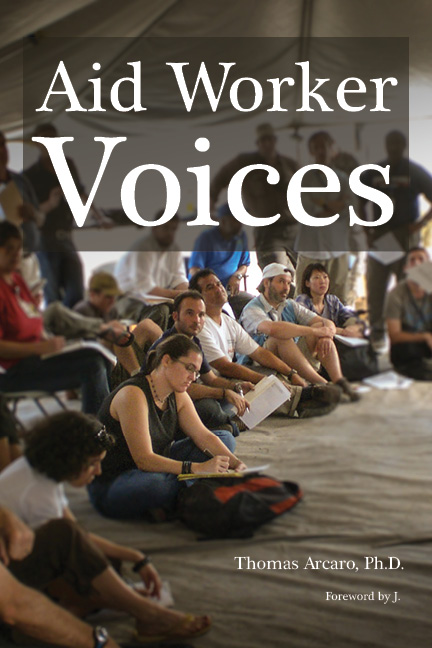This is an excellent snapshot of the experiences of aid workers
“This is an excellent snapshot of the experiences of aid workers. Dr. Arcaro’s commentary is engaging, often humorous and gives important context (and occasional limits) to the quotes from the workers themselves. Dr. Arcaro and his team chose questions that solicited thoughtful replies — and garnered a surprising variety of responses. Chapters address issues as diverse as corruption in the field to balancing work with family to the future of humanitarian aid. This is a must read if you are in the field or are considering entering it. However, many of the concerns the workers expressed provide a glimpse into modern life as well — and I would recommend it for a broader audience as well.”
MUST read for anyone curious about aid work
“If you are an aid worker, know/live with/are married to an aid worker, or just want to know more about what exactly aid workers experience – this book is for you! Reading this has been like reading my own diary – I found myself saying “YES!” more than once in relation to the experiences shared by the survey respondents. Dr. Arcaro does a superb job of breaking down survey results, adding witty commentary, and giving aid workers a relatable narrative they can share with people in their worlds who don’t understand quite what it is that we do (NO, we’re not spies). I loved this book, and think it’s a must read for anyone seeking insight into the aid workers world!”
An imperative read for those trying to understand the complex relationship between aid work and the state of the world today
“The book Aid Worker Voices was a very impactful read for me. Truthfully, I found a lot of it to be surprising. I had an (incorrect) notion prior to reading this book that most aid workers were optimistic about the state of the world, and that’s why they chose aid as their line of work- because they felt they could make a difference. However, I found the voices of the aid workers to be surprisingly sober about the complexity of aid work and the seeming inability to fix the many problems of this world and the institutions that exacerbate them. I also found it surprising just how impactful aid workers found their jobs to be, in ways both good and bad. They described an inability to “un-see” anything they had witnessed in their work. I believe this creates a sense of isolation in aid workers, as they have seen far more than the many privileged members of society that turn a blind eye to injustice, evil, and need. This, to me, illustrates the need for the book. Aid workers need a space to articulate and share how their very unique work has made them feel. To debrief, decompress, and feel a relief that others have shared similar experiences. No matter what your relation to aid work is- whether you yourself engage in it, a loved one does, or you are simply interested in the industry, this book is a must-read as it highlights the very profound voices of those who are actually serving on the front lines. We have become accustomed to “social justice warriors” sharing informative articles or writing long rants on social media, but how many people do we know that are actually living in the midst of the injustice, trying their best to remedy it? Aid Worker Voices chronicles the story of those who are, and subsequently, is an imperative read for those trying to understand the complex relationship between aid work and the state of the world today.”



 Follow
Follow